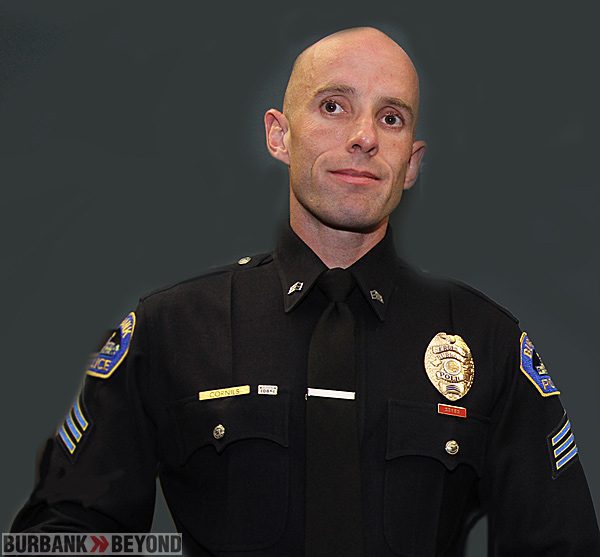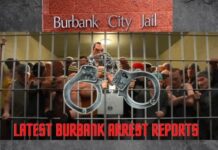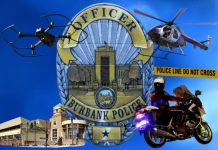For 95% of Burbank residents, interaction with the Police Department is limited to seeing a patrol car cruising through the neighborhood, driving past a traffic stop or accident, or seeing a bicycle patrol cruising down San Fernando Blvd.
For Sergeant Cornils and Officer Santiago working the Burbank PD night shift, it is a much different world. Kicking off the evening with a patrol through a crowded downtown area, Sgt. Cornils explains that the holiday season brings additional challenges. Thefts from automobiles jump in public parking lots, shoplifting increases, and with so many people on the streets the potential for conflicts is always present.
First Stop. Older model automobile with expired tags identified on Magnolia. A quick look through the car produced no illegal items, and the driver was counseled to update the tags and registration.
Sgt. Cornils believes treating all citizens with respect, regardless of the situation, will result in citizens being more cooperative, gain trust, and continue to open lines of communication with police.
Second Stop. Domestic violence call. Woman indicated a boyfriend had pushed and threatened her. Drugs were found on the boyfriend (needle and a packet containing crystal meth), and all involved were under the influence. All were well-known by the police as chronic substance abusers and offenders, and do not have permanent addresses within Burbank. A female officer, who is also a specialist in quality of life issues, was called to both pat down the victim to check for illegal drugs or weapons, and provide some on-the-spot counseling to the victim.
Patrol officers in Burbank work one of 10 main sectors, with several officers and a supervisor floating between sectors as required during the shift. Officers become familiar with their assigned beats, developing a good knowledge of where the highest probability of incidents or events may occur. This might be around industrial areas, hotels, or known gang and drug houses.
Third Stop. Suspicious vehicle in an industrial parking lot. While patrolling in an area with businesses normally closed at night, a vehicle with two males was seen in the front parking lot. The two males claimed they were waiting for a cousin to come and open a storage room in one of the businesses. While waiting for confirmation the story was correct, the officer located an open bottle in the male’s car. Officer requested and received permission to inspect the rest of the car and trunk, and no suspicious items were located. Confirmation received, the bottle was discarded and individuals were thanked for their cooperation and cleared.
Officers develop a 6th sense, or the ability to “feel” how a given situation may develop, such as the likely behavior of a person or persons in a field interview, such as a traffic stop, emergencies, or service call. This sixth sense is a product of many years experience. While an officer can gain specific skills in classroom or field training exercises, many years working a beat is the only way to gain the awareness and experience needed to fully assess and control an event.
Fourth Stop. Suspicious car leaving a known gang member and drug user’s house. Subject was known to the officer, and it was determined he was not involved in any illegal activity – cleared.
The news is full of traffic stops gone bad, officers assaulted, and situations escalating to the point an individual or pair of officers could potentially lose control or be put at a disadvantage. In Burbank, each police officer is well aware of other officer’s activities, and keep a “third eye” open in the event any officer requires assistance or support.
Fifth Stop. Backing up another patrol which has stopped an intoxicated woman exposing herself at a gas station and convenience store. Woman was well-known to Burbank police, and had a .18 breathalyzer test result. Arrested and prepared for transport to Glendale Jail.
Public intoxication and driving while under the influence is a problem in any city, and Burbank has its fair share of substance abusers. Violent or serious auto accidents during evening hours are much more likely to include at least one substance abuser. Officers keep their eyes open for drivers showing signs of impairment, and are rarely wrong when making a stop for a suspected drunk driver.
Sixth Stop. Supporting an officer who stopped a car for suspected driving under the influnce (DUI). Driver was an elderly man who had jumped several curbs with his automobile, and had difficulty keeping the car in lanes. Driver failed a field sobriety test, and breathalyzer indicated a .223 blood alcohol level. Arrested, and Sgt. Cornils noted one more threat to safety on Burbank’s streets had been eliminated.
No human being is without emotion, and all are capable of anger. While it may seem trivial, and possibly appear to be noise, it is better to call the police to resolve an argument or dispute, rather than allowing it to get out of control and result in a fight or other violence.
Sgt. Cornils noted it is very difficult to predict domestic violence or arguments that may escalate into violence, and sadly the police become involved at the point there may have already been a crime committed by one or more participants. Sgt. Cornils continued to explain police officers do not like to be put into a reactive mode, greatly preferring a proactive approach to their job.
Seventh Stop. Call to check out a conflict between parties regarding the disposition of a mobile phone. Difficult to confirm mobile phone ownership, however the officer provided counseling on how to resolve the situation. Reporting party calmed down. Advice was to quickly inform her telephone company of the loss of her phone, and then acquire a new phone the next day if hers had not been returned.
Upon completing the counseling, the distressed woman who had lost her phone warmly thanked the officers for their response and advice.
The police need to keep an open line of communication with civilians and citizens. The better the lines of communication, the better the probability citizens will contact police when they see unusual activities or conditions. When citizens have confidence in the police, then they will work better as a community and take care of each other.
Eighth Stop. A citizen noticed his neighbor’s door is open, and there were no lights on in the property. Nobody responded to knocks on the door, so the citizen called police in fear something might have been wrong. Officers responded, checked out the property, found nothing wrong, and left a card asking the owner to give a call if they found anything amiss.
Sgt Cornils refers to one aspect of his patrol called “hunting.” Patrol officers go hunting when there is a break in the calls, and they have time to provide both police visibility in their assigned sectors, as well as be on the lookout for unusual activities. Hunting brings the patrol officer through alleys, parking lots, or areas prone to vandalism or crime.
Ninth Stop. In a parking lot behind a Burbank hotel, the Officer Santiago noticed a couple emerging from the rear of a trash bin. The woman was a known prostitute, the man possibly under the influence of drugs. Both were from other states, had no jobs, and were clearly surprised they had been stopped for a field interview. As no crime was observed, the officer noted the activity, counseled both individuals, and continued hunting. Subjects were released.
Tenth Stop. In the early morning hours a car was observed parked in front of a location with substance abuse rehabilitation patients. As the patients are clearly at risk, any car parked in front of the build could potentially be providing drugs or other controlled substances to the patients.
During a field interview the Officer Santiago concluded the driver was waiting to drive one of the residents to a job. Officer Santiago was more concerned predators and drug dealers were in the area trying to disrupt the lives of rehab patients. Cleared, no arrests made.
If the Burbank police need to make an arrest, a health interview is required at the time of arrest. If the detainee has a known health issue that falls into a specific category, the detainee requires medical screening at a facility, such as Providence St. Joseph’s Medical Center (SJMC), prior to being jailed. Once the clearance is received, the detainee is transported to Glendale Jail. Glendale jail is being used by Burbank during construction at the Burbank Police and Fire Headquarters.
Eleventh Stop. The intoxicated lady arrested during the fifth stop was transported to SJMC due to erratic actions and complaints of severe migraine headache while being processed at Glendale Jail. Prior to processing at Glendale Jail, the lady needed to be sent back to Burbank and SJMC to receive evaluation and clearance prior to being accepted at Glendale Jail.
A second set of officers was required to relieve the original transporting and arresting officers due to other requirements. Two officers were required to supervise the woman as she received minor treatment for her alleged migraine. Officer Santiago responded to SJMC with another officer to take over supervision. This detail took two officers off the street for a total of nearly 6 hours.
While at SJMC several other detainees, including one arrested for a fight involving a stabbing, and one involved in suspicion of DUI, were cycled through SJMC for health screening prior to transport to Glendale Jail.
During early morning hours some behaviors and activities are not normal, and grab the attention of partrol officers. There may be groups of people walking the streets together, individuals hanging out on street corners, activities near known gang member houses and drug houses, or something as simple as a single person in the street who does not belong in that area. Any unusual activity will trigger the officer’s 6th sense.
Twelfth Stop. Support another officer who had stopped a young male riding a bicycle erratically during the early morning hours. The young male was returning home, without identification, to a location outside the city of Burbank. While the officers may have had justification to detain the young man, they were more concerned with his safety. After making a cursory check of his bags, and finding no controlled items, they counseled the young man on safety and released him to return home.
During the field interview a known “White Fence” gang member strolled by on the sidewalk, greeting officers with a mocking offer to provide assistance if needed.
Throughout the evening it was clear a majority of incidents, stops, and interviews involved individuals who are well known to Burbank police officers. For those of us who rarely, if ever interact with the police, it is confusing why so much attention is required to keep the action of so few under control.
As a citizen we expect to go out to indulge in the holiday season with family, friends, and colleagues. Little regard is given to the potential of danger due to gang activity, theft, or risk of becoming involved in an incident resulting from an accident or assault. The 95% of us who rarely, if ever, require support of police services.
Much of the credit for this is due to the average American living a law abiding lifestyle consistent with good values and personal judgment. For everybody else, the Burbank Police Department is on duty, on the hunt for those who may wish to disrupt the holidays and quality of life we’ve all come to expect and enjoy Burbank.
NOTE: The author is a reporter with BurbankNBeyond. The reporter participated as a night shift ride along with the Burbank Police Department in December of 2011 . The reporter spent the evening in a supervisor’s car (Sgt. Cornils), and with a patrol officer, Officer Santiago.
All actions recorded are actual stops and arrests, with names, locations, and times removed to ensure privacy of those detained, who are all considered innocent until found guilty in court.



















First Stop: Older model automobile with expired tags identified on Magnolia.
Counseling the driver on updating the tags was important, so the officer decided to search the entire vehicle first and was unable to find updated tags.
“Sgt. Cornils believes treating all citizens with respect, regardless of the situation…”
Third Stop: Two men are spotted sitting in their car in a parking lot. Very suspicious. They were waiting for someone to open up a gate. The officer spotted an open beer. After dumping it out he proceeded to search the entire vehicle but couldn’t find the previous driver’s updated tags.
Twelfth Stop: An unidentified young male is stopped for riding their bike erratically by another officer–our Officer jumps into action to provide backup. While the officers could have prevented him from returning home they were more concerned with the young man’s safety so they proceeded to search the young man’s bags but once again found nothing incriminating. No controlled items and still no sign of that first driver’s updated tags!
In the early morning hours, groups of people walking together, individuals standing alone on corners, or something as simple as a single person in the street who does not belong in that area (…?) will trigger the officer’s 6th sense–those people will have some explaining to do and hopefully some interesting things to search!
Comments are closed.